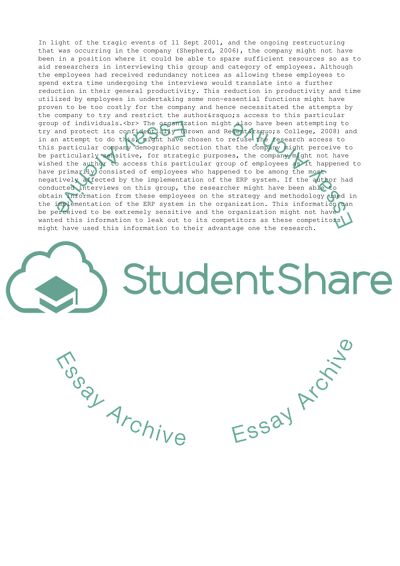Cite this document
(Response to Questions Based on Shepherd C's Constructing Enterprise Assignment, n.d.)
Response to Questions Based on Shepherd C's Constructing Enterprise Assignment. Retrieved from https://studentshare.org/business/1803961-read-constructing-enterprise-resource-planning-a-thoroughgoing-interpretivist-perspective-on-technological-change-and-read-its-a-question-of-trust-balancing-the-relationship-between-students-and-teachers-in-ethnographic-fieldwork-then-ans
Response to Questions Based on Shepherd C's Constructing Enterprise Assignment. Retrieved from https://studentshare.org/business/1803961-read-constructing-enterprise-resource-planning-a-thoroughgoing-interpretivist-perspective-on-technological-change-and-read-its-a-question-of-trust-balancing-the-relationship-between-students-and-teachers-in-ethnographic-fieldwork-then-ans
(Response to Questions Based on Shepherd C'S Constructing Enterprise Assignment)
Response to Questions Based on Shepherd C'S Constructing Enterprise Assignment. https://studentshare.org/business/1803961-read-constructing-enterprise-resource-planning-a-thoroughgoing-interpretivist-perspective-on-technological-change-and-read-its-a-question-of-trust-balancing-the-relationship-between-students-and-teachers-in-ethnographic-fieldwork-then-ans.
Response to Questions Based on Shepherd C'S Constructing Enterprise Assignment. https://studentshare.org/business/1803961-read-constructing-enterprise-resource-planning-a-thoroughgoing-interpretivist-perspective-on-technological-change-and-read-its-a-question-of-trust-balancing-the-relationship-between-students-and-teachers-in-ethnographic-fieldwork-then-ans.
“Response to Questions Based on Shepherd C'S Constructing Enterprise Assignment”, n.d. https://studentshare.org/business/1803961-read-constructing-enterprise-resource-planning-a-thoroughgoing-interpretivist-perspective-on-technological-change-and-read-its-a-question-of-trust-balancing-the-relationship-between-students-and-teachers-in-ethnographic-fieldwork-then-ans.


